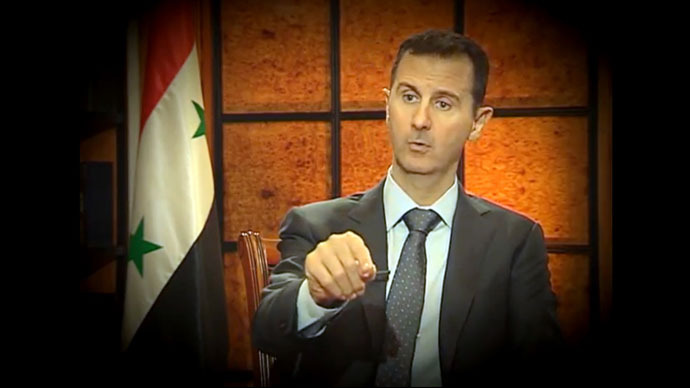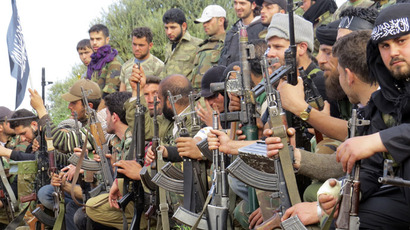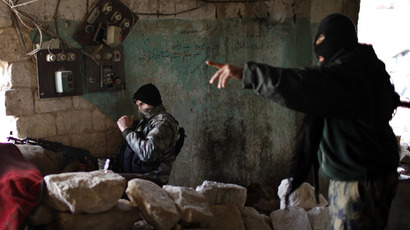West will pay for 'supporting Al-Qaeda' - Assad

Syrian President Bashar Assad has cautioned in a TV interview that the West will pay a heavy price for allegedly helping Al-Qaeda extremists in the country’s two-year uprising, adding that the government’s defeat is out of the question.
In the statement that was made on Wednesday to state channel Al
Ikhbariya, Assad warned that "The West has paid heavily for
funding Al-Qaeda in its early stages. Today it is doing the same in
Syria, Libya and other places, and will pay a heavy price in the
heart of Europe and the United States."
He stressed that "from the first day, what is happening in
Syria is dictated from abroad."
Assad’s interview also comes within a week of jihadist
extremists the Al Nusra Front swearing support to Al-Qaeda’s
commander Ayman al-Zawahiri, who’s idea it had been initially to
turn Syria into an Islamic state.
The president continued to say that Syria was “facing a new
war, a new method, with fighters, some of whom are Arabs, not
Syrians," and that the "army is not fighting a war to
liberate Syrian territory, but a war on terror."
While the president did say that progress was being made, he
also pointed toward some “big powers, in particular the United
States, that do not accept countries to be independent; they want
them to be submissive." Although the West has claimed on
occasion not to be supporting Al-Qaeda, Assad added that
"everyone who carries weapons and attacks civilians is a
terrorist, be they Al-Qaeda or not."
The president went on to say that the defeat of his government
would herald Syria’s downfall, and therefore he could and would not
surrender. "The truth is there is a war and I repeat: no to
surrender, no to submission", he said.
"There is no option but victory. Otherwise it will be the end
of Syria, and I don't think that the Syrian people will accept such
an option," he added.
When questioned about his own future, he only said that the
decision should be up to the people of Syria.
"The position (of president) has no value without popular backing. The people's decision is what matters in the question of whether the president stays or goes", which could mean the president’s intention to run for another term in next year’s elections.

Assad turned to the topic of Jordan - which currently holds around a half-million Syrian refugees - blaming the country for condoning the free movement of rebels to and from Syria. He had the following to say on the matter:
"I cannot believe that hundreds (of rebels) are entering Syria with their weapons while Jordan is capable of arresting any single person with a light arm for going to resist in Palestine." He also gave a word of caution.
"We would wish that our Jordanian neighbors realize that...
the fire will not stop at our borders; all the world knows Jordan
is just as exposed (to the crisis) as Syria."
US Defense Secretary Chuck Hagel meanwhile addressed Congress with the intention of deploying 200 US troops to Jordan in order to contain cross-border violence and thwart any supposed chemical weapons attack that might take place inside Syria. Amman's Information Minister Mohammed Momani spoke of the plans:
"The deployment of the troops is part of US-Jordanian
military cooperation to boost the Jordanian armed forces in light
of the deteriorating situation in Syria," Momani told AFP. The
precise date of the deployment remains unclear.
Spokesman for the Executive Intelligence Review Magazine
Lawrence Freeman believes that regime change has always been on the
minds of the West, but that the scope of the war effort is much
wider than a confrontation with Syria.
“The reality is that President Obama and Tony Blair…have been
very intent on regime change in Syria, and their target is broader
than Syria. The target is confrontation - a game of ‘chicken’ with
Russia and China to back down and submit to US - NATO policy
control over the region and globally.”
Despite this, Freeman added that certain members of the American
military actually argue completely against the idea of military
intervention, saying it would be detrimental to the entire regional
peace effort.
Freeman also makes a connection between the Middle Eastern
strategy of Western powers and the collapse of the European banking
system, seeing a direct correlation with the escalation of tensions
in the region:
“It’s not unrelated to the fact that the European financial
system is in a state of collapse – as we’ve seen in Spain and
Greece and are now seeing in Cyprus. As this system collapses,
which comes out of the City of London financial empire crowd,
you’re going to see more and more creeping towards actual
escalation of war as a way of dealing with the collapse of their
financial system.”
Freeman drove the point home by explaining that “the people
behind this financial system want to neutralize the Russians and
the Chinese, so they are no longer an obstacle…it’s much bigger
than [removing] Assad.”
One of Syria’s closest allies, Russia, meanwhile warned that the Friends of Syria group, who are opposed to the government in Damascus, are playing a “negative” and are not helping the situation progress. Russia’s Foreign Minister Sergey Lavrov told reporters in Istanbul, in reference to the 2012 agreement on ending the conflict by diplomatic means that “right now we see this process is making a negative contribution to the (Geneva) decisions."
The next meeting of the Friends of Syria is scheduled to take place on Saturday in the Turkish capital.
The bloody uprising that has gripped Syria for two years now has taken the lives of over 70,000 people and displaced over a million.















